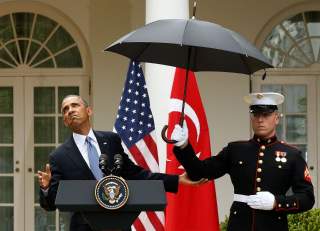Navigating the Post–Obama World
The big question now is: will the Trump presidency be a bridge toward a more positive or negative recalibration of America’s role in the world.
Finally, none of this will be possible without a newfound sense of unity and national purpose in America. Granted, that might sound a little fanciful in this age of hyperpolarization and partisanship. But if America can merely reverse one of the more dangerous trends in American politics—the upsurge in unilateral presidential policymaking—the U.S. could take a huge step back toward not just Constitutionalism, but the steadying influence of consensus politics.
Presidents of both parties are of course equally guilty of contributing to this trend. But the pendulum swing between the Obama and Trump administrations on policies crafted solely by the president has been truly dizzying. Indeed Obama's heavy reliance on executive authority both domestically (immigration and environmental orders) and internationally (circumventing the Senate's treaty power to enter the Paris and Iran accords) shows the tenuous nature of this approach. Obama's Democrats were repeatedly punished at the polls for these overreaches. Besides, the policies themselves, lacking the traditional force of law, were easily swept away by his successor.
Alexander Hamilton, himself no slouch on executive power, anticipated this long ago when he insisted presidents win the broad support of the country (via two-thirds Senate consent) on all "delicate and momentous" issues relating to America's "intercourse with the rest of the world." This way, he argued, the government can best ensure "wisdom" in its policies and the "trust" of the people.
Granted, expecting authoritarian-minded Trump to heed that advice is surely unrealistic. And, in many ways, his corrective to the Obama years was both inevitable and necessary.
But perhaps, in the not-so-distant future, out of all this chaos may emerge some consensus-building big thinkers as we witnessed in the past; with the likes of Franklin Roosevelt, Arthur Vandenberg, Ronald Reagan, and Daniel Patrick Moynihan. Leaders whose strong partisanship was matched only by their reverence for America's Constitution and institutions; and whose ideas and actions helped strengthen America abroad and at home.
As far as I can tell, such leaders have yet to appear. But that’s the thing about America. More often than not another corrective course may be right around the corner.
Stuart Gottlieb is an international affairs professor at Columbia University, where he teaches American foreign policy and international security. He formerly served as a foreign policy adviser and speechwriter in the U.S. Senate (1999-2003).

